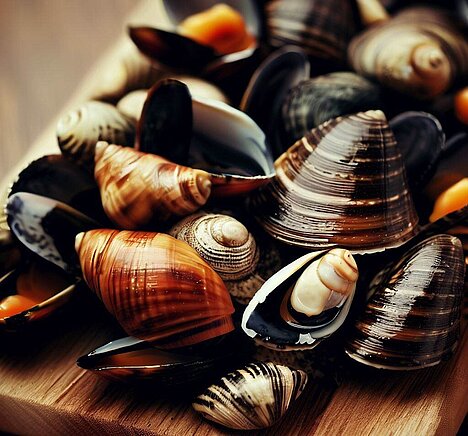Molluscs

Molluscs are a group of animals that have no vertebral column and usually have a shell or a shell. These include, for example, mussels, snails, squid and octopuses. Some molluscs are edible for dogs and can even provide health benefits. But there are also some risks that you should be aware of before feeding your dog molluscs. In this article, you'll learn more about the pros and cons of molluscs for dogs and how to prepare them properly.
Benefits of Mollusks for Dogs
Mollusks are rich in protein, which is important for muscle building and cell regeneration. They also contain many minerals such as iron, zinc, copper, and iodine, which are important for blood formation, the immune system, and thyroid function. Mollusks are also a good source of omega-3 fatty acids, which have anti-inflammatory effects and may promote heart health. Some studies have shown that omega-3 fatty acids can also have positive effects on the brain, behavior, and mood of dogs.
Drawbacks of Mollusks for Dogs
Mollusks are not suitable for all dogs. Some dogs may be allergic to mollusks or experience digestive issues. Additionally, mollusks may contain contaminants such as heavy metals, bacteria, or parasites, which can lead to poisoning or infections. Therefore, you should only buy fresh and high-quality mollusks and wash and cook them thoroughly before giving them to your dog. Raw or spoiled mollusks can be very dangerous for your dog. Also, the shells or casings of mollusks can have sharp edges and cause injuries to your dog's mouth or digestive tract. Therefore, you should always remove or crush them before feeding them to your dog.
How much and how often can I give mollusks to my dog?
The amount and frequency with which you can give mollusks to your dog depend on various factors, such as age, weight, health status, and activity level of your dog. However, generally, mollusks should only serve as a supplement to your dog's regular diet and should not exceed more than 10% of his daily calorie intake. For example, a 10 kg dog should not receive more than 50 g of mollusks per day. You should also be careful not to give your dog too many different mollusks at once to avoid intolerances or overwhelm. It's best to start with small amounts and observe how your dog reacts.
Molluscs can be a tasty and healthy addition to your dog's diet if you choose, prepare and dose them correctly. They can provide your dog with important nutrients and support his health. But you should also be aware of the potential risks and be careful when feeding your dog molluscs.
If you notice any signs of hypersensitivity or poisoning in your dog, you should see your vet immediately. We are not a substitute for a vet, but we try to be as accurate as possible. Every dog reacts differently and we recommend you get a second opinion or consult your vet if in doubt.
Stay healthy and take good care of your four-legged friend!😊